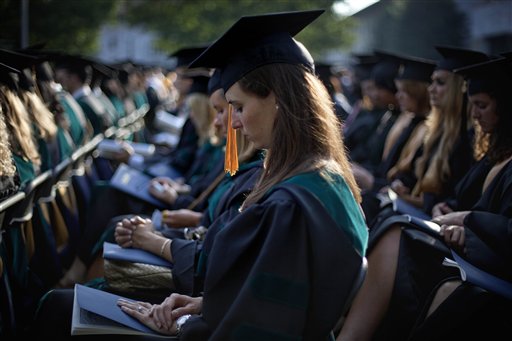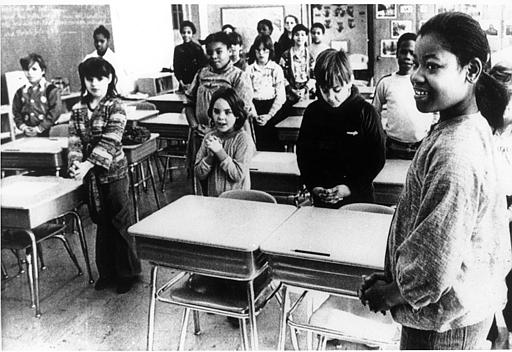Prayer at public school events is a controversial and complicated topic because it can involve three clauses of the First Amendment: the establishment clause, the free exercise clause, and the free speech clause. The Supreme Court has shown particular concern with subtle and not-so-subtle coercive pressures in elementary and secondary schools.
History of challenges to prayer in public schools
As early as Engel v. Vitale (1962), the Supreme Court declared that public prayer in public schools violated the establishment clause. In this instance, a prayer approved by the New York state board of regents was read over the intercom during the school day when students were required to be in attendance.
Other public events are slightly different, because attendance is not viewed as mandatory in most cases. In many cases, however, these public events are, essentially, required events, and the Court has considered them to be such. In Lee v. Weisman (1992), the Court held 5-4 that claiming a teenage student in contemporary society has a real choice not to attend his or her graduation was not at all realistic.
Similarly, in Santa Fe Independent School District v. Doe (2000), where a prayer prior to the start of football games was being challenged, the Court acknowledged that while student attendance at football games was mostly voluntary, the football players and cheerleaders did not have the option of leaving the premises during the reading of a prayer.
A deeper look at protecting students' religious freedom
In Lee v. Weisman (1992), parents of a public school student were challenging a practice of secondary principals in the public schools of Providence, Rhode Island, who customarily invited members of the clergy to give invocations and benedictions in graduation ceremonies. Robert E. Lee, the Nathan Bishop Middle School principal, invited Rabbi Leslie Gutterman to offer prayers at the graduation of Deborah Weisman’s class. Lee advised him the prayers should be non-sectarian. The girl’s parents disagreed with this practice and four days prior to the ceremony unsuccessfully sought a temporary restraining order to prevent the prayer. Following the ceremony, which they did attend, they filed suit to stop this practice in the future.
When the case reached the Supreme Court, the issue for the Court was whether including prayers, offered by clergy, as part of the official public school graduation ceremony was consistent with the religion clauses of the First Amendment. The majority opinion held it was an undeniable fact that the school district’s supervision and control of the ceremony placed public and peer pressure on attending students to stand as a group.
The opinion relied quite heavily on the argument that there are heightened concerns with protecting freedom of conscience from subtle coercion in the elementary and secondary public schools. The Court’s reasoning was that the district’s supervision and control of a middle or high school graduation ceremony places subtle and indirect pressures on attending students to stand as a group or maintain respectful silence during the invocation and benediction. A reasonable dissenter of high school age could believe that standing or remaining silent signified personal participation in, or approval of, the group exercise, rather than respect for it. In the opinion, the Court acknowledged that if the affected citizens were mature adults, the choice to stand or remain seated during the prayers could be viewed differently.

The federal courts of appeal have upheld prayer at university graduations. The Supreme Court, however, has yet to rule on a case in higher education. In this photo, graduate Megan Hollar bows her head during a moment of prayer at Emory University’s commencement ceremony Monday, May 9, 2011 in Atlanta. (AP Photo/David Goldman, used with permission from the Associated Press)
Student-led prayer at football games violated the First Amendment
In Santa Fe, a Mormon and a Catholic family together challenged the practice of the high school in Santa Fe, Texas, of having a student council chaplain deliver a prayer, described as overtly Christian, over the public address system before each home varsity football game. The Supreme Court held that the school district’s policy permitting student-led, student-initiated prayer at football games violated the establishment clause.
The opinion concluded that the football game prayers were public speech authorized by a government policy, taking place on government property at government-sponsored school-related events, and the district’s policy involved both perceived and actual government endorsement of the delivery of prayer at important school events.
When have courts upheld prayers at schools?
The federal courts of appeal have upheld prayer at university graduations. In 1997 the Seventh Circuit Court of Appeals said, in Tanford v. Brand, that Lee’s holding did not extend to college graduations, because college students were mature enough and not as easily coerced to stand and pray. The same year, in Chaudhuri v. State of Tennessee, the Sixth U.S. Circuit Court of Appeals upheld a graduation prayer at Tennessee State University, citing, as did the Seventh U.S. Circuit Court, the maturity of the students. The Supreme Court, however, has yet to rule on a case in higher education.
This article was originally published in 2009. J. Mark Alcorn is a high school and college history instructor in Minnesota. Hana M. Ryman is a Middle School Humanities Educator in Orlando, Florida.

